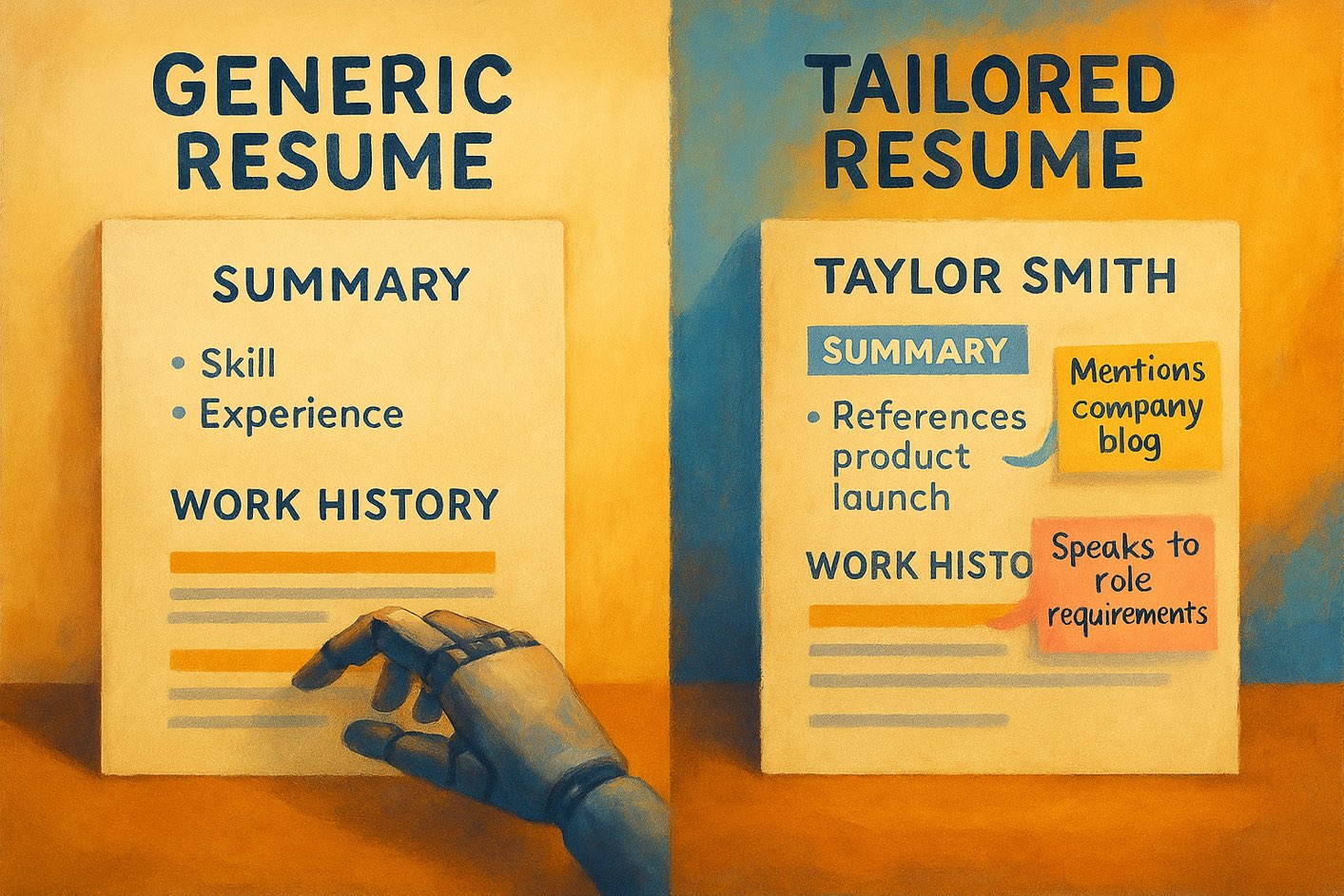
How to Get a Remote Job
My sister recently finished an online course on how to become a UX designer with the aim of finding a remote job. She learned the basics of the skill and created a portfolio she can now use when applying for jobs. As her brother—and someone who began as a designer but has since hired dozens of designers for various software businesses—she asked for my advice on how to go about getting work.
I struggled to give her a simple answer.
There were so many areas where she would likely stumble at the first hurdle. I’d be surprised if she even secured an interview. This wasn’t her fault—she was entering a new career, a completely new world with no insight into modern remote work. Her competition spans the globe, and hiring juniors is becoming less desirable as AI advances take over entry-level tasks. Meanwhile, more experienced professionals are perceived as better able to leverage AI effectively due to their existing knowledge base.
She was about to encounter the same pitfalls I’ve witnessed across tens of thousands of applicants over the past 15 years. This article is my response to her, and hopefully will increase your chances of landing a remote job too. There are some hard truths here that may indicate you’re not yet ready for remote work, but you’ll find actionable insights to help you get there.
Is this guide for you?
I want to place a strong disclaimer here that this post is highly opinionated and may be more applicable to those seeking a job in a smaller tech startup or remote business. That is where in my experience lies, and I may look for different things to a big company. I also have not applied directly for a job since 2008.
I struggle to see, however, how what follows isn’t at least somewhat useful to anyone applying for a role.
The hard truth—It’s very hard to get a remote role with limited experience or skill
If this describes your situation, you have a very low probability of landing a specialized skilled job like a designer right now—let alone securing an interview.
The only reasons you would are:
- The company is starved for choice and desperate
- The role is an internship or similar (still hard)
- Pre-existing relationship within-team / trusted referral
- Some other not role released reason (e.g. attracted to you, diversity hire)
You can of course still apply for jobs, but most likely you’re wasting your time unless you’re learning from each application and not just spraying and praying.
How to get more experience
No magic answers here, I’m afraid. You need to level up in any way you can. Real world experience is best. So offer to work on projects related to your chosen career path for free, create your own projects, work cheaply on Upwork or other similar service. These reps will give you experience and insight, and should in the process level up your skill. Opportunities have a miraculous way of appearing by just putting yourself out there and doing stuff too.
Note: Sometimes you can still get a job without the required experience if you’re able to convince the employer their you’re motivated and willing to learn, they might take a chance on you.
How to get more skill
Beyond real work experience, you should continue learning and improving your abilities in your chosen career. YouTube tutorials, online courses, mentorship—whatever works for you. The caveat I have here, and one some people will have a hard time with, is that you may not be naturally suited to your chosen career or have the innate skills required to rise to the top. That said, I do believe for many roles, if you have the right drive, you can make it happen.
Mentorship is well worth exploring. I know lots of people who would be happy to offer time to mentor for free, but they’re not seeking out people to mentor. You need to seek out people you want to mentor you. Find people, message them, try to strike a rapport first don’t just demand free time. If you show commitment and effort with your mentor, there’s a fair chance that relationship could lead to something in the future too, it’s someone rooting for you, bringing you up to acquaintances etc.
How to know if you have the required skill
The fastest way is to ask people already in the industry. Get feedback from those doing the job—if you don’t know anyone, post in online communities or reach out on LinkedIn. You’ll be surprised who replies. Compare that feedback with job descriptions and your own work to see if you’re there, or where to level up.
From here we’ll assume you’ve acquired the necessary experience and skill that won’t stand in your way when applying, what follows is how to avoid all the other mistakes I see again and again which either result in an instant rejection or being cut for consideration from an interview.
Your job application

Read the job description, and do what it tells you
The number of applicants who do not simply read the job listing, and apply as it asks, is fairly astounding. For me, there’s no hesitation but to instantly reject someone who ends up in this bucket.
A typical remote job is going to attract anywhere from hundreds to thousands of applicants. The person responsible for hiring, has to figure out how to get from that, to one. You likely have less than 30 seconds to grab the attention of the person screening you application before they move on. That means they’re looking for specific signals as quickly as possible to make a decision if they should spend more time on your or not. They need/want to whittle the number down to something manageable as quickly as they can. There are various ways this might happen:
1. Automated system screening
A human never even sees you and you get automatically rejected. We’re more and more employing software systems which analyse your application and CV for specific keywords, experiences, skills, typos etc. Reliance on AI to answer questions is also being penalised more and more. Anything that reduces the likelihood of you being the best applicant may count against you.
In addition, if the system can’t extract data from your CV due to how you’ve created it, you might get rejected for that too.
You may actually be the best applicant, but at this point be a victim of just not saying or doing the right things.
2. Recruiter/HR screening
A person who most likely lacks experience in your specific role, screens applications before sending them to the hiring manager. They look for similar qualifications as automated systems, but with a human eye for red flags such as employment gaps or job-hopping patterns. They will do this first online, then sometimes you may get through to a screening call where they’re looking for further insight into your fit for the role, both experience-wise and culture-wise.
This approach allows the hiring manager to focus on their primary responsibilities rather than getting bogged down in every step of the hiring process. By delegating initial screening to a dedicated team member or outsourced recruiter, managers can concentrate their limited time on interviewing only the most qualified candidates (at least in theory).
3. Decision maker screening
Here, someone who will be involved in the decision and likely has experience in the role will screen your application. They will likely still spot similar issues to an automated system or recruiter. But here you have a slightly increased chance because they’re more capable of spotting what they want and may look past smaller issues that an AI or middle-man is not employed to do. They might see something in you that gives you a chance (if you’re very lucky).
The first and most simple thing you can do when applying, is to ensure you’ve not giving the hiring manager the chance to disqualify you, by reading the job listing and ensuring your CV, any written cover level or other questions tick the boxes that need ticked.
If you don’t, you really only have yourself to blame for not getting considered for roles.
However, ticking the boxes will only get you past this stage on some occasions. If you truly want the job you’re applying for you should go further, and the further you are willing to go, the greater your chances of getting a role or other opportunity will be.
Tailor EVERY aspect of your application to EVERY role

Regardless of which screening process your application goes through, if you are to be successful, at some point your application will need to convince a decision maker at the business that you are worth their time in an interview. That means every interaction with the employer from your first application must make you stand out. The first and most simple way to stand out is to actually take the time to tailor your submission to the business. You’d be surprised how few applicants actually do this. So what does tailoring mean?
First and foremost, chill out when you see a role you’d like to apply for and don’t just hit the apply button. Assuming the business name is listed, you should now take the time to research them and try to establish what you could say to make you a stand out applicant.
The employer can ultimately ask you to provide whatever information they want in order for you to submit an application, but 99% of the time you will be asked for your CV, and sometimes a cover letter (becoming less common). Regardless, whatever you’re asked to provide, tailor it to the business.
Tailoring your CV
Many applicants think of the creation of a CV as a “one-and-done”. Something you only need to update when you’ve something new to add which helps sell you. That may be the case, but I’d bet that on most occasions, some tailoring of things like a summary about you, or specific experiences/accomplishments could be tailored to increase your chances.
In general your CV should highlight not just skills and experience, but also things you’ve accomplished. Data and proof points like quotes from colleagues are good. When applying for a remote role, any evidence that you’ve worked remotely successfully before also helps.
🚩 Do not rely on AI models to write your answers or apply for you

Remote hiring is brutally competitive. In 2025, it’s easy to throw an application into ChatGPT and paste the result. But everyone’s doing that—and recruiters (or their AI’s) can smell it. AI-generated answers are easy to spot: generic, bloated, and vague.
By all means leverage AI to get ahead, but only if it actually does that. If your application doesn’t sound like you, it’s working against you.
There are also AI systems popping up which will apply for you and save you loads of time but with the exact same issues if not worse as you are further removed from the application process.
TL;DR: Write your own applications if you want a job.
Personalise everything
Tailoring isn’t just swapping in the company name. Show you’ve done your homework:
- Mention something recent (product launch, blog post, tweet)
- Quote a line from the job spec and link it to your experience
- Say why now is the right time for you to join them
Keep it short, punchy, and specific
Remote hiring means scanning hundreds of applications. Get to the point:
- Before: “Experienced in UI/UX design across multiple platforms”
- After: “Redesigned mobile app interface that increased user engagement by 43% in 3 months”
Aim for 3–4 high-impact lines, not an essay.
Add proof—even if it’s simple
Specifics build trust:
- “Redesigned UI that improved user retention by 37%”
- “Created responsive design system used across 6 products”
- “Contributed to weekly design critiques with product and engineering”
No need for grand claims—real numbers beat fluffy ones.
Be visibly remote-ready
Hiring remotely is high-trust. Show you can work without hand-holding:
- Mention remote tools (e.g. Notion, Slack, Loom, Linear)
- Flag async wins: “Cut stand-ups by 50% by switching to Loom updates”
- Use examples of autonomous work: “Built a demo portal without a brief—shipped in 2 weeks”
Prove you manage yourself
Remote teams favour low-maintenance, proactive hires. Signal that subtly:
- “Wrote handover docs to unblock team while on holiday”
- “Created onboarding guide to speed up new hire ramp-up”
- “Set personal OKRs aligned to product goals—shared weekly updates”
Communicate like a pro—in writing
In remote teams, your writing is your reputation. Prove you’re good at it:
- Link to a blog post or doc you’ve written
- Mention if you replaced meetings with written specs or updates
- Include a note like: “Known for clarity in async comms”
Make your work history legible
Remote hiring is international—and often fast. Don’t leave ambiguity:
- Explain gaps: sabbatical, caregiving, freelance, side project
- Clarify odd transitions: “Moved from agency → product to learn PLG firsthand”
- Summarise roles clearly if job titles were unclear or localised
Include references
Many employers will expect to speak with people you’ve worked with previously to learn more about you. Don’t make them have to ask for references, include them on the CV.
Don’t ignore your LinkedIn profile
Have a great LinkedIn profile, regardless of if you hate LinkedIn or not, get over it. It’s standard and hirers will look for it. Put effort to make it great along similar lines to the above, and be sure to get some written recommendations on there. Anything a potential employer can find out about you online should help sell you.
For more CV tips watch this:
Make yourself memorable and valuable

Tailoring is great, but you’ll still be just one of many tailored applications. You need to stand out to stand the best chance.
Beyond having a great tailored application that ticks all the boxes, you should present yourself as a candidate who brings unique value above the rest of the pack.
What exactly you can do will depend on the role and your background. For example, someone applying to a software startup might highlight how they’ve integrated AI tools like ChatGPT into their workflow, increasing output by a specific percentage.
This shows the employer you’re at the forefront of tech advancements and may have unique insights that could help their business gain an edge. You instantly become more interesting than other candidates—unless they’re all saying the same thing.
Another example: if you’re between jobs and freelancing, consistently marketing yourself through blogs, Instagram reels, or other content demonstrates work ethic and immediately sets you apart from about 99% of applicants. Figure out your unique angle.
Taking it a step further, create something bespoke for the company that relates to the role. A web designer might build a simple website showcasing their potential value to the company.
Whatever approach you choose, make it authentically yours.
Other ways to increase your chances of getting an interview

Get a referral
A referral from the right person inside the company, or external person who has a pre-existing relationship with someone in the company can be a big boost to your chances. If you’re lucky enough to have a relevant connection you should absolutely leverage it.
Consider reaching out to build a rapport
It may be worthwhile to connect with the recruiter or decision maker on LinkedIn or by email in an attempt to build a rapport and stand out. This one is tricky to do right and I wouldn’t recommend it every time. If you choose to do it, make sure you get your message in front of the right person, keep it short, polite and offer value if you can. Ask something they can easily answer if you’re hoping for a response.
You’ve sent your application… now what?

Once you’ve applied it’s largely out of your hands and whatever process the business has chosen will be followed.
If you’re successful, you may get a screener call where a recruiter is trying to establish further if you’re a fit worth moving forward, straight through to a video interview, or some kind of take home challenge to complete.
If you’re unsuccessful, it’s quite possible you’ll hear nothing or get an automated rejection email. Always take the opportunity to ask for feedback. If the deadline for applicants has passed and you’ve yet to hear back, consider asking for an update.
How to interview well
If you get to the interview stage you should re-read the job post and conduct further research to deepen your understanding of the business’s market, problem they solve, the solution, and their company culture.
Based on these, try to establish what you think they’re looking for. You can then pre-prepare some answers to have talking points should a relevant question get asked. Having your own questions prepared in advance is also well worthwhile and shows you’ve done your research and are truly interested. You might ask about company culture, growth opportunities, or specific challenges they’re facing. Quality questions demonstrate your seriousness and thoughtfulness.
For a remote role, an employer is likely looking for the right mix of skills, cultural fit, effective communication, self-motivation, and the ability to work independently. So prepare accordingly for questions around these.
The interviewer will most likely be working directly with you, so no matter how well qualified you are, you could fail here simply because they don’t feel a rapport with you.
How to present well on a video interview
Make sure you’ve got a quiet room and working equipment. Ideally a set up that looks you’re already well prepared for remote work. Turn off notifications on your devices and don’t be afraid to have some notes aside if needed.
Dress appropriately for a real world interview and practice good body language—sit up straight, make eye contact and smile.
Try to build a rapport, demonstrating enthusiasm and acknowledging statements to show you’re actively listening. Show them you’re someone it would be great to work with.
When you’re asked a question, take a moment to consider your response. Structure your answer clearly, using specific examples to illustrate your points. This not only shows that you’re thoughtful but also ensures your answer is comprehensive and relevant. Remember, it’s okay to pause briefly to gather your thoughts; a well-considered response is always better than a rushed one.
Speak clearly and concisely. Focused answers are often preferred, no need to ramble on, it just eats up time and may result in a dis-engaged interviewer.
Be prepared to tell them your salary expectations.
Try to close on a strong note by expressing your enthusiasm for the role and the company. Briefly summarise why you’re excited about the opportunity and how you can contribute to the team and ask what the next step is.
Waiting for a next step or decision

At this point, the next steps depend on the company’s hiring process. You may have additional interviews (technical assessments, panel interviews, etc.) or they might be making their final decision. During this time, they could be conducting background checks or seeking references. If you’re asked for any additional information, respond promptly and professionally with what they need.
If you haven’t heard back within the timeframe they specified, it’s appropriate to send a polite follow-up email. This not only shows your continued interest but also demonstrates your proactivity—a valuable trait for remote workers. Keep any follow up brief, reaffirm your enthusiasm for the position, and ask if there’s any additional information you can provide to assist in their decision-making process.
Getting rejected
If you receive a rejection, always ask for feedback. Don’t take it personally – keep it productive. Ask questions like “What could have strengthened my application?” or “Were there specific qualifications I was missing?” Use this feedback to improve future applications rather than dwelling on disappointment. Remember that hiring decisions often involve factors beyond your control so it’s not necessarily that your application was bad. You might not get an answer, follow up if you don’t, I don’t think there’s any harm. Most people don’t do this, therefore they learn basically nothing from their applications.
Getting an offer
Congratulations! If you’ve made it this far, your hard work has paid off. When you receive a job offer, it’s important to carefully review all aspects of the offer, including salary, benefits, work hours, and any other terms of employment. Don’t be afraid to negotiate if you feel the offer doesn’t meet your expectations or market standards. Remember, this is your opportunity to ensure the role aligns with your career goals and personal needs. If you’ve made it here once you likely will be able to again, but if you’re out of work you may not want to push back too much just yet.
What else can you try beyond simply applying for a role?

There are other ways to get in front of companies, or potential hirers. Below I’ve detailed some of these.
Work with a recruitment agency
You can reach out to a recruitment agency to see if they will represent you to employers. They often specialize in specific industries and maintain relationships with hiring managers at various companies. This approach can give you access to opportunities not publicly listed.
Pros of working with a recruiter include their industry connections, insider knowledge of job openings, and ability to potentially fast-track your application. They can also provide valuable feedback on your resume and interview skills. However, it’s important to remember that recruiters work for employers, not job seekers, and may not always have your best interests as their priority.
Get networking
From my experience, so many opportunities just seem to happen from getting to know people. Getting out there and networking is a powerful way to increase your chances of something good happening. In-person is for sure the most successful approach, so attend relevant events, ask for advice from local people, meet people struggling for work in your industry, honestly whatever, you just put yourself out there and see what happens.
If you already know people who work in your industry they’re a great place to start, asking for advice, people to connect with and events to attend.
You can try this online too but it will be harder. Online can be a good way to meet people to work on projects with for some real world experience but the connections are always a little more fickle and transient than any developed real-world relationships.
Don’t wait for a job to be advertised
If you find a company that appeals to you, don’t wait for a job posting—send an application anyway. Positions might become available in the future.
Not all jobs are advertised publicly. It’s worth reaching out to a manager at a business you admire, as you never know when an opening might be coming up.
Many businesses prefer to avoid the expense of formal job advertisements and instead rely on word of mouth or existing connections. I’ve hired for several positions that were never publicly advertised, simply because I knew someone who was a good fit and decided to bypass the traditional hiring process altogether.
Over to you
I hope you find some of this helpful. The job search process can be demanding, but with the right approach and mindset, securing a remote position is possible. Remember that persistence is key - many successful remote workers faced numerous rejections before finding their ideal role. Focus on continuous improvement of your skills and application based on feedback you receive along the way.
If you’d like any direct advice feel free to contact me.